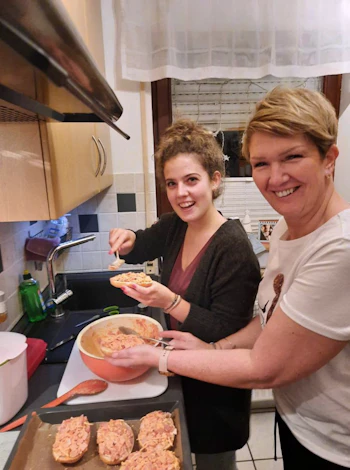High school exchange program in Germany
Live and study like a German teenager, immersing yourself in the local way of life for a short-term, semester or year exchange program.














Experience true Germany – the land of forests and castles
Student exchange program in Germany
In Germany, every place has a story to tell – from the impressive Gothic-style cathedrals to the murals on the Berlin Wall. The country exudes history and warmly welcomes anyone who wishes to immerse themselves in its unique and vibrant culture. With countless castles, museums, monuments and festivals, Germany is a dynamic and modern place that excels in various domains: architecture, music, theatre... combined with a high quality of life and excellent education system, Germany can’t help standing out!
Embarking on a high school exchange program to Germany is an unmissable opportunity to experience the history, customs and flavours of this unique people, while boosting your German language fluency.

A place full of surprises
For a better world
Precision, organisation, innovation: the staples of German society will surprise and inspire you! Your classes at school will start and end on time, the streets will be clean and tidy, and the people around you will value efficiency and responsibility (intended both as self-accountability and social responsibility).
What’s high school like in Germany?
Open approach
German schools are hospitable, inclusive and open to innovation and new ideas. You will be spurred to think outside the box, assert your opinion and contribute in class. You will feel part of your school community in no time!
Academic excellence
The German education system is known to be excellent and ranks amongst the top in Europe. Creativity, group work, debating, innovation and independence play a big part in German schools and will gift you a great educational experience.
Bildung
German schools uphold the concept of Bildung, which refers to a holistic process of personal development and self-cultivation. Through education, knowledge, emotional maturity and solid ethics, young people can gain a deeper understanding of the world and their place in it.
Friendship
School equals new friendships! Despite the stereotypes, German youths are very open and friendly. Make the most of everyday school life to meet local people and spend the afternoons (which are usually free in Germany!) with your new friends.
In the heart of Europe. Let Germany surprise you with an exchange experience!
Choose authenticity – trust WEP and prepare to be amazed.
On a WEP Classic program, you will experience the most authentic side of Germany. You may be placed anywhere in the country, depending on the location of the host family who has chosen you to share this incredible adventure with.
Volunteer host family
Public school
Placement anywhere in Germany
Short-term, semester or year programs available
Your host family during your exchange year
Gain a second family – they can’t wait to welcome you into their lives!
Here is why:
According to stereotypes, German people come across as cold and distant. However, it won’t take long to find out that in reality, Germans are curious and with a unique sense of humour. Your host family will be excited to get to know you and discover your personality bit by bit!
Traditional German households include parents and children; however, single-parent host families are also a possibility. Regardless, you will immerse yourself in the German way of life and live like a true local!
You will slide into the daily life of a German family, and their routine will become yours. Iconic festivities and celebrations, local specialties, unique places that most tourists don’t know about... forget travel guides and learn how to live the authentic German way.
German teens tend to be independent and have many hobbies. Step out of your comfort zone by exploring new interests and trying new activities, just as your peers in Germany do!



Your school in Germany
Find out more about your school experience in Germany
School in Germany begins at age 6, when children enter primary school (Grundschule) which lasts four years, from grade 1 to 4. The next step is determined by which Länder (region) each student lives in, as there are different types of secondary schools.
The main staples of the education system are based on:
Participation in class Raising your hand, asking questions, offering your opinion during discussions and debates, are all viewed favourably. These actions will also help you become an integral part of your school community.
Group work You will routinely work with your classmates in a group setting, conducting research or preparing presentations together. Practicing your teamwork skills will be a helpful exercise in preparation for your future study or workplace.
Planned tests Preparing for exams is an important process. Tests in German schools are all planned in advance, to give students the time and opportunity to prepare at best.
The German education system
In the German system, students can only choose optional subjects to personalise their educational path from year 10 onwards. Before year 10, all subjects all compulsory, to make sure all pupils receive an even, equal preparation.
After year 10, students can put the knowledge and study methods they've learned to the test, focusing on their areas of interest and choosing subjects accordingly.
Subjects in Germany
Secondary school in Germany caters to students from 11 to 18 years of age, thus incorporating both middle and senior schooling. There are three possible secondary education programs:
- Hauptschule: similar to Australia’s VET (Vocational Education and Training), students in this program gain practical skills and industry-specific knowledge in their chosen sector. By the end of their studies, they obtain a professional license and complete a workplace-based apprenticeship.
- Realschule: popular amongst German youth, “real school” has a strong focus on language learning and business-related subjects, preparing students for office/administration jobs.
- Gymnasium: the most demanding type of program on offer in Germany, typically targeted towards academically gifted students who would like to prepare for university. The weekly commitment is 32-40 hours, including several hours of independent study outside of class.
At the end of their chosen educational program, students take the Abitur, the equivalent of our Senior Secondary Certificate of Education (SSCE).
Germany secondary school
Most German schools don’t offer extra-curricular activities, meaning that if you wish to play a sport or try a recreational activity, you will need to research (with the help of your host family or coordinator) a club or sports centre in your local community.
School in Germany can be very demanding and for this reason students spend some of their free time studying or completing homework. In their downtime, German teens visit local national parks, museums and attractions, or simply unwind with friends and family.
Extra-curricular activities
The German academic calendar includes several breaks throughout the year. Each region picks their holiday dates, to avoid holiday-makers overcrowding highways across the country all on the same day.
During the year, you will enjoy Herbstferien (two-week long Autumn break), Weihnachtsferien (Christmas holidays, also for two weeks), and Osterferien (Easter holidays, between one and three weeks). As your schedule at school will be full, including up to 40 hours a week if attending a Gymnasium, you will welcome these rather long breaks!
In addition, all schools close for six weeks during the summertime and are also closed on October 3rd for German Unity Day and October 31st for Reformation Day.
The school calendar
The grading system in Germany is quite different from Australia. In secondary schools, work is graded on a scale from 1 to 6, where 1 is the highest mark and 6 the lowest (with 4 being the passing grade). At the end of each semester, students don't receive an official report but rather a “credit” for each subject they've passed.
Grades in Germany
Stories from students and parents who have been there
Here are the testimonials of families who have chosen WEP for their exchange experience.
Join one of our upcoming events
to learn everything there is to know
about our high school exchange programs!
Going with WEP is best
Since 1988, a wide choice of destinations and comprehensive assistance before, during and after your overseas program. WEP is the ideal partner for your big overseas adventure.
Like you, we also get to choose who we travel with: our schools, host families and overseas partner organisations are carefully selected.
We offer a custom-made insurance policy, specifically designed for our participants, and we have a solid network behind us.
Emergency assistance, overseas and from Australia, is available 7 days out of 7, 24 hours a day, 365 days a year.
Allowing all our participants to live their desired overseas experience is a mission, a challenge we're thrilled to accept.
FAQ
Your host family, local coordinator and your host organisation will provide you with support while you are overseas. WEP Australia will remain in contact with the host organisation and your parents to coordinate and support your experience. In case of an emergency, both you and your family will be able to call an emergency phone number that is answered 24/7.
You will be advised of your placement location, host family and host school as soon as feasible. This can range from a few months prior to departure, right up until departure, as a lot needs to happen behind the scenes before each student's placement process is complete and can be communicated to you with certainty. The placement process doesn't only include sourcing a suitable host family, but also finding availability at a local school, and completing all red tape (including, for example, lenghty criminal history checks in some countries). Prior to departure from Australia, all students will receive host family, host school and local coordinator details.
Independent travel is not permissible while on exchange. However, you will be able to travel with your host family, school, host organisation and other community groups such as sporting teams or scouts. Again, the foremost aim of the program is educational, and your priority for any holiday periods must be your host family, who will be investing a lot of time, energy and money into this experience - simply in return for your frienship and positive contribution to their household.
Generally speaking, overseas schools won't issue a diploma to exchange students who are only there for a short time and don't graduate at that school. You may however be provided with a honorary certificate, as well as a WEP certificate of completion, which however don't count towards credit or graduation in Australia.
Language experience is desirable, but not necessary, for most countries. However, some countries have mandatory language requirements. You'll find the specific requirements for each country listed on its page. Intensive language courses may, in some circumstances, meet language pre-requisites. WEP strongly recommends language preparation prior to departure as language knowledge is of enormous benefit in assisting you to quickly adapt to your new family, school and life.
Of course, there are English-speaking destinations available if you are not interested in learning another language.
No, it's the host families who choose the student they wish to invite into their home. Based on the documents you will submit as part of your WEP application, one lucky family will choose to open their home and hearts to you, which is why for all Exchange Classic programs, and many Flex programs as well, there is no avenue for students to choose a specific location.
It may be possible to live with an overseas family that you already know (excluding relatives of the student). However, the family will have to be screened and approved, prepared and supported by our partner organisation in the same manner as any other host family. School enrolment must also be available.
More questions?


